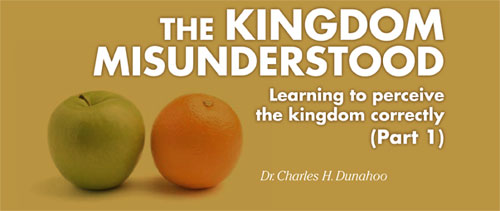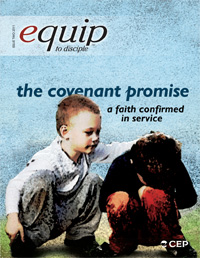
Editor’s Note: This is the first of a two part article dealing with the misperceptions many Christians have of the kingdom of God. What is ther ole of believers in the kingdom, how are they to impact the broader kingdom? Are there really two kingdoms?
Introduction
I begin by introducing you to Bill and Mary Wright. Bill is a 34 year old husband and father of two children, Terry 10 and Susan 7. Mary is a stay at home mom and has home schooled her children for a couple years, though they are presently attending a Christian school that meets in their church. Bill and Mary are active church members and clearly demonstrate a love for the Lord that is obvious to others.
Bill is a member of a successful law firm. He teaches a young adult Sunday school class in his church and is very active in civic events. He is on the church’s board of officers. You might call the Wright’s the quintessential Christian family.
Bill majored in political science in college and later entered law school. Presently, he is an active member of the bar. For several years Bill has had a desire to become more involved in politics. His friends have suggested that on a number of occasions, so has his wife Mary. He represents the more conservative line of political thinking and is certainly an advocate for rule of law in our country.
Read entire Equip 3rd Quarter, 2011 (Acrobat Reader required).
But as Bill thinks about this, he wrestles with a dilemma. He is a Christian and believes in church and state separation; therefore he wonders how he can be a good Christian and involved in politics at the same time. He has been taught by the system to think of religion as belonging to the private area of his life, including family and church, but politics is more for the public arena. He does not want to compromise his Christian faith by involving himself in an area that would require him to keep his religious beliefs, his Christian faith, to himself.
Bill’s situation reminds me of another occasion when I was teaching a seminar to leaders from several churches. The topic for the day was making kingdom disciples. I spent some time developing the point that there is actually more involved in making disciples than is often reflected and practiced by many today. I was explaining how being a Christian involved more than merely having a personal relationship with the Lord, than reading the Bible, praying, and witnessing. My point was that Christianity is a way of life, a total way of life, which many Christians fail to understand, especially today.
Christianity is a way of life, a total way of life
In trying to be as clear as possible, I said there is a sense in which you are no more spiritual when teaching a teenage Sunday school class on John 3:16, than you are teaching an eleventh grade mathematics class. The Bible teaches God’s special truth in what we would call the spiritual realm and the mathematics class teaches God’s truth in that broader realm. I continued–the only way you can know what John 3:16 means is for God to teach it to you and the only way that you can know that 2 plus 2 is 4 is because God is the author of all truth. Both are true because they come from God, as the God of all truth. Jesus commanded us to “make disciples” and we do that according to him, by teaching to observe all things whatsoever he has commanded, and by necessary inference, he has taught us. (Matthew 28:19 & 20).
If we see God’s truth wholistically, we are to be spiritual in everything that we do, 24/7 both in an out of the church. I am aware in saying this, many Christians do not understand this discipleship process. Their paradigm has been based on a wrong view of the church and kingdom, as well as discipleship itself. We will show this later, but for now, some see the church and kingdom as two separate entities while others see them as one and the same. While we believe neither of those are representative of the Bible’s teaching on the church of Jesus Christ and the Kingdom of God, it is so important to understand what the two are and how they are related, especially as they impact our worship and service of God.
On another occasion I was speaking at an annual convention of Christian school leaders. On the program was a young man who had also been influenced by the teachings of Francis Schaeffer. At that time he was serving in a staff position in Washington, D. C. He said in his address, that we would be pleased and amazed at how many of our members of Congress attend regular Bible studies. (This was several years ago). But then he said, you would be disappointed to see some of those same people move into the legislative hall and fail to incorporate those biblical truths into the issues with which they were dealing.
There is a false scenario that has penetrated our western world, including many of our churches, and it has caused people to see life from a dualistic, even fragmented perspective, thus creating Bill’s dilemma and keeping that 11th grade math teacher from seeing himself as a disciple maker in teaching math.
My purpose in this series of articles is to understand and evaluate the fallacy of Bill and Mary’s thinking about politics, and their misunderstanding of the church and Christianity, the false dichotomy reflected in the math class, and the failure of those politicians in Washington to know how to apply biblical truth to their civil responsibilities.
I want us to consider how the above examples have grown out of a wrong paradigm regarding education, especially Christian education and disciple-making but especially a wrong paradigm of the church and the kingdom of God (“The Lord has established his throne in the heavens, and his kingdom rules over all” Psalm 103:19; “Your Kingdom is an everlasting kingdom, and your dominion endures throughout all generations.” Psalm 145:13).

 Editor’s Note: The following article was written by Bob Edmiston who has served CEP as Coordinator of Training and is presently a consultant. A major part of CEP’s ministry is oriented to the “rising generations.” With that word, we commend the following article to you.
Editor’s Note: The following article was written by Bob Edmiston who has served CEP as Coordinator of Training and is presently a consultant. A major part of CEP’s ministry is oriented to the “rising generations.” With that word, we commend the following article to you. We have looked at all four learning styles. Did you find where you fit? Even more, have you learned to appreciate that not everyone learns in the same way you learn? This time I want to go a step further and explain how learning styles fit in different cultural settings, and next time how it even affects different denominations.
We have looked at all four learning styles. Did you find where you fit? Even more, have you learned to appreciate that not everyone learns in the same way you learn? This time I want to go a step further and explain how learning styles fit in different cultural settings, and next time how it even affects different denominations. To use a biblical phrase from Galatians 6, the church is quite possibly now reaping what we have sown. On occasion, I will hear people say something along the lines of “this current generation of young people is more biblically illiterate than at any point in church history.” Let’s lay aside for a moment the difficulty of quantifying such a statement and for the sake of this article take it at face value. If the myriad of researchers who have concluded that young people imitate the religious faith and actions of adults who love them are right and if this current generation of young people is indeed biblically illiterate, then it does not take much of an intellectual leap to conclude that the generational consequence of adult actions in regards to knowing and applying scripture is being seen in our young people. I suppose this is actually a simple mathematical equation: A (adult religious actions) + B (youth emulate adult religious actions) = C (generational consequence: biblically illiterate youth who are abandoning the church).
To use a biblical phrase from Galatians 6, the church is quite possibly now reaping what we have sown. On occasion, I will hear people say something along the lines of “this current generation of young people is more biblically illiterate than at any point in church history.” Let’s lay aside for a moment the difficulty of quantifying such a statement and for the sake of this article take it at face value. If the myriad of researchers who have concluded that young people imitate the religious faith and actions of adults who love them are right and if this current generation of young people is indeed biblically illiterate, then it does not take much of an intellectual leap to conclude that the generational consequence of adult actions in regards to knowing and applying scripture is being seen in our young people. I suppose this is actually a simple mathematical equation: A (adult religious actions) + B (youth emulate adult religious actions) = C (generational consequence: biblically illiterate youth who are abandoning the church). Perhaps the best solution that I can give to this conundrum is anecdotal evidence from two youth groups. The first is from Safe Harbor Presbyterian in Stevensville, MD. When the youth director, Christian Graham, decided to make significant changes in the youth ministry moving from a more traditional youth program to one that revolved around a deeper Bible study in order to better foster Christian community, he did so with some trepidation. Not that he was going to stop the occasional games and other relational activities but Christian wanted to elevate the Bible study within the program. The first week a grand total of 2 students showed up. That would be fine if there were only 4 students in the youth group but this was a decrease of over 30 students. Perhaps teaching Romans verse by verse to teenagers was not the best idea for growing a youth group. However, within a month the group had grown again to over thirty students who each week eat homemade waffles and then feed on God’s word together. The second is about the youth group at Carriage Lane Presbyterian Church in Peachtree City, GA. Assistant Pastor of Youth, Brian Cosby, began feeling like his students were hindered in their study of the New Testament by not knowing Greek. So, he did what all the latest youth ministry books say to do for growing your youth group; he offered to teach a Greek class. Expecting 2 or 3 of his more academically minded youth to show up, Brian was shocked when fifty youth showed up to learn biblical Greek in order to be able to study scripture more fully. As with all anecdotal evidence, there are always instances that prove the opposite to be true as well. So, I cannot suggest that youth will show up in droves at your church if you start teaching God’s word in deeper ways. Yet, I am convinced that as adults who are charged with discipling our young people, we must begin teaching in a deeper, more satisfying manner and then demonstrating with our lives the transformational power of the Word.
Perhaps the best solution that I can give to this conundrum is anecdotal evidence from two youth groups. The first is from Safe Harbor Presbyterian in Stevensville, MD. When the youth director, Christian Graham, decided to make significant changes in the youth ministry moving from a more traditional youth program to one that revolved around a deeper Bible study in order to better foster Christian community, he did so with some trepidation. Not that he was going to stop the occasional games and other relational activities but Christian wanted to elevate the Bible study within the program. The first week a grand total of 2 students showed up. That would be fine if there were only 4 students in the youth group but this was a decrease of over 30 students. Perhaps teaching Romans verse by verse to teenagers was not the best idea for growing a youth group. However, within a month the group had grown again to over thirty students who each week eat homemade waffles and then feed on God’s word together. The second is about the youth group at Carriage Lane Presbyterian Church in Peachtree City, GA. Assistant Pastor of Youth, Brian Cosby, began feeling like his students were hindered in their study of the New Testament by not knowing Greek. So, he did what all the latest youth ministry books say to do for growing your youth group; he offered to teach a Greek class. Expecting 2 or 3 of his more academically minded youth to show up, Brian was shocked when fifty youth showed up to learn biblical Greek in order to be able to study scripture more fully. As with all anecdotal evidence, there are always instances that prove the opposite to be true as well. So, I cannot suggest that youth will show up in droves at your church if you start teaching God’s word in deeper ways. Yet, I am convinced that as adults who are charged with discipling our young people, we must begin teaching in a deeper, more satisfying manner and then demonstrating with our lives the transformational power of the Word.